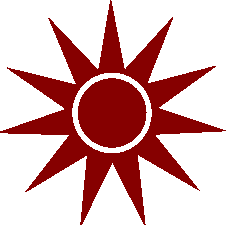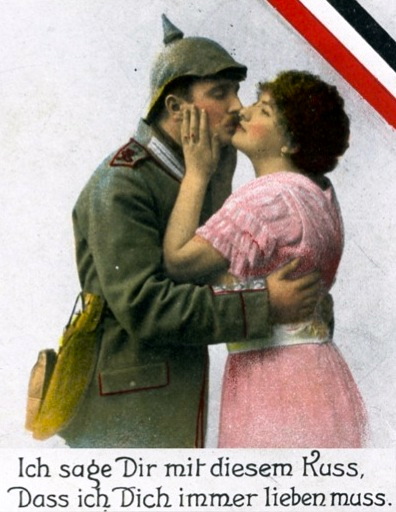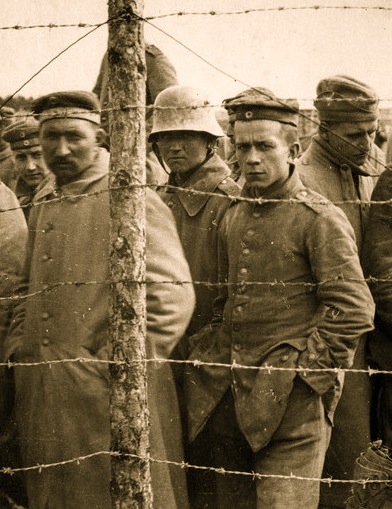RESEARCH PROJECT
This is the major assignment of this course. It is worth a full thirty percent of the course grade and is the basis for the oral presentation (worth an additional ten percent) that is given by each student at the end of the course. For your research project you will select a specific topic related to the general subject of the First World War and/or its legacies and write an extensive, in-depth essay based on scholarly research and critical analysis.
|
1. Preparing an Annotated Bibliography
The first step in the research project is to select a topic and begin to locate relevant sources and scholarship. Each student is required to meet with the instructor to get his or her topic approved before beginning the project. By the end of the sixth week of the semester you must have your topic approved and have identified the documents (or other source material) and many of the scholarly books and articles that you will use. Having done this, you will submit a 1-2 page annotated bibliography listing the sources and scholarship you have collected that you plan to use for your research essay. This assignment itself will not be graded, but failure to submit it on time will be factored into the final paper grade. The annotated bibliography is intended to ensure that you have begun this project in earnest and to help the instructor track your progress and, if necessary, assist you with any problems in identifying and obtaining sources or research materials.
In your annotated bibliography you must state the specific topic of your essay, along with the main research question or questions that you want to ask as part of your argument. You should also state briefly why your topic is important or relevant to a larger understanding of the First World War and/or its legacies. Then list separately (1) the primary sources or texts you plan to use and (2) relevant scholarly books and articles. Each must have a full citation followed by a brief, one-line description of its contents and usefulness to your research.
The annotated bibliography is due at the beginning of class on Wednesday, March 4.
|
2. The Perils of the Internet:
The enormous volume of information now on the Internet has been both a
blessing and a curse to those doing academic research. Many websites,
especially official sites of libraries and archives and those that reproduce
historical documents and literary texts, are excellent. However, since just about anyone can
create his or her own website, there is little quality control over
information placed on the Internet. Unlike most books and articles,
websites can present information and views that are usually able to
bypass the judgment of discerning publishers, editors, and peer reviewers. Consequently,
many websites are amateurish, polemical, and factually
unreliable. As you do your research, keep a healthy skepticism about
information that comes from the web.
|
3. Sources and Citations:
Since this is a college-level research essay, you must use an acceptable method of citation for academic scholarship and you must use it correctly and consistently throughout your essay. Acceptable forms of citation include footnotes, endnotes, and parenthetic citations. You must also include a full bibliography at the end of the essay with complete and separate entries for each source used. If you choose to use footnotes or endnotes you should provide a full citation when you first refer to a source and then an abbreviated citation for every subsequent reference to that source. You must account for all your sources, even quotations from one author embedded in the writing of another. If you have any questions about proper citation practices please speak with the instructor or
consult the College's Academic Integrity Policy
and Turabian, A Manual for Writers of Term Papers, Theses, and Dissertations (9th edition) for further guidance.
In addition to books, academic journals often contain the most recent research and developments within specialized fields of
study. JSTOR, Project Muse, and other electronic journal databases will prove useful in identifying scholarly articles relevant to your topic. For primary sources you should consult the Watzek Library History Research Guide.
As you work on this project for the remainder of the semester, I am happy to meet with you at any time to discuss your topic and assist you with any difficulties that you may encounter. In addition, Parvaneh Abbaspour (parvaneh@lclark.edu, x7277), the science & data services librarian in Watzek Library, has generously agreed to serve as the library liaison for our section of E&D. You should feel free to contact her for assistance in using the resources in the library and finding the necessary material for your project, but please have a clear idea of your topic and research question(s) before you schedule an appointment with her.
|
4. The Essay:
Your essay should be 10-12 pages of text and it must have a title. All pages must be doubled-spaced, numbered, and must use standard fonts and margins. The narrative of your essay (the presentation of facts, analysis of research material, or historical chronology) should be structured around an argument or thesis. It is not enough merely to relate facts that are already known, retell a familiar story, or rehash a familiar argument. The most important objective of your essay is to present an original argument, theory, or analysis that is supported by a critical approach to your sources. Keep in mind that you are writing this essay mainly for yourself rather than for your instructor. Pick a topic in which you are truly interested and that you think is important for your own understanding of the First World War and/or its legacies.
Research for the essay should center on a few well-selected sources (original documents from the period that have not been interpreted or edited by other scholars) as well as drawing upon a variety of scholarly and/or scientific works (books or articles written about your subject). The definition of sources is broadly conceived and may, among other things, include works of visual art or musical compositions as well as written documents. In conducting your research keep in mind that the sources and scholarship are equally important. While the sources should be the focus of your argument, the scholarship will help you get a sense of how your argument compares to those of other academic experts. Additionally, your essay must conform to the following specifications:
 All pages of text must be double-spaced using a standard font (the most common is Times New Roman, 12-point font size). Images and the bibliography do not count toward these page limits. All pages of text must be double-spaced using a standard font (the most common is Times New Roman, 12-point font size). Images and the bibliography do not count toward these page limits.
 Pages must be numbered. If you include a separate title page (optional) this page should not be numbered. Page 1 is the first page of text. Pages must be numbered. If you include a separate title page (optional) this page should not be numbered. Page 1 is the first page of text.
 Margins must be 1" at top and bottom and left and right. Margins must be 1" at top and bottom and left and right.
 The bibliography should list primary and secondary sources separately. As you know, this distinction is not always clear so this may involve some judgment calls on your part. The bibliography should list primary and secondary sources separately. As you know, this distinction is not always clear so this may involve some judgment calls on your part.
 Bibliography entries should be single-spaced and all lines after the first line of an entry must be indented 0.5" Bibliography entries should be single-spaced and all lines after the first line of an entry must be indented 0.5"
 Quotations longer than 3 lines or 30 words (whichever is longer) should be inserted as block quotations. The entire block quotation is single spaced and set in from the left margin 0.5" (the same as the indentation of a new paragraph). Block quotations do not need quotation marks. Quotations longer than 3 lines or 30 words (whichever is longer) should be inserted as block quotations. The entire block quotation is single spaced and set in from the left margin 0.5" (the same as the indentation of a new paragraph). Block quotations do not need quotation marks.
 If you choose footnotes or endnotes as your form of citation, these must be single-spaced and may be between 11- and 12-point font size. The first mention of a source requires a full citation while mention of that same source in subsequent footnotes should be given an abbreviated citation. If you choose footnotes or endnotes as your form of citation, these must be single-spaced and may be between 11- and 12-point font size. The first mention of a source requires a full citation while mention of that same source in subsequent footnotes should be given an abbreviated citation.
 Section headings within the body of the essay, if these are used, should be in bold or italics so that they stand out from the text. Section headings within the body of the essay, if these are used, should be in bold or italics so that they stand out from the text.
|
In writing and revising your essay you should consult the History
Department Writing Guidelines and Grading Standards. Additionally, you might find a visit to
the Lewis & Clark Writing Center and the following reference works helpful:
 Kate L. Turabian, A Manual for Writers (9th Edition) Kate L. Turabian, A Manual for Writers (9th Edition)
 Strunk & White, The Elements of Style Strunk & White, The Elements of Style
 Wilson Follett, Modern American Usage: A Guide Wilson Follett, Modern American Usage: A Guide
|
Finally, be sure to edit and proofread your essay thoroughly before
submitting it. Poor syntax or structure and excessive errors in spelling, punctuation, or grammar will
lower your grade.
The research essay is due at 5:00 pm on Thursday, May 7.
|
5. The Oral Presentation:
As part of the semester research project each student will complete an oral presentation. Your presentation will last ten minutes and will be given in class to an audience of your classmates and your instructor. The first 7-8 minutes of the presentation will be for you to speak followed by 2-3 minutes for responding to questions from your audience.
The focus of your presentation is your research topic and should be a concise synthesis of the content and argument of your essay. Your presentation should be guided by the following questions, but it is not limited to them:
 On what specifically are you doing research and why is it important to our understanding the First World War and its legacies? On what specifically are you doing research and why is it important to our understanding the First World War and its legacies?
 What sorts of research materials are you using and how did you find them? What are the main strengths and limitations of these materials? What sorts of research materials are you using and how did you find them? What are the main strengths and limitations of these materials?
 What academic methodology or perspective(s)—i.e. psychology, history, political science, etc.—are you employing in your project? What academic methodology or perspective(s)—i.e. psychology, history, political science, etc.—are you employing in your project?
 What is the original argument you are making based on your research and how does this compare to those of other scholars who have written on your topic or on ones similar to it? What is the original argument you are making based on your research and how does this compare to those of other scholars who have written on your topic or on ones similar to it?
 What has been the most interesting or unexpected thing you have learned during the course of your research? What have been the greatest challenges in your research and in the formulation of your own argument? What has been the most interesting or unexpected thing you have learned during the course of your research? What have been the greatest challenges in your research and in the formulation of your own argument?
|
Since your presentation will be given before the final essay is due, it is understood that you are presenting on a project that is not yet complete. You may indicate in the presentation the parts of your research or the formulation of your argument that are still in progress.
During your presentation you may use PowerPoint slides, short video or audio clips, or show artifacts. However, please be aware that these tools, if you choose to use them, are meant merely to enhance your presentation; they are not the focus of the presentation. If you use PowerPoint it should be for showing images only and for no other reason (definitely not for displaying a bullet-point outline of the content of your presentation). You certainly should not read from the screen of a PowerPoint presentation at the expense of maintaining contact with your audience. Likewise, if you play audio or video clips these should be very short (90 seconds at most) since your total presentation time is extremely limited.
Ultimately you will be evaluated primarily on your own speaking and presenting skills. These include clarity, style, composure, voice projection (your audience must be able to hear you), enthusiasm, engaging with your audience (eye contact), organization, and your ability to keep within the allotted time limit. As with any performance, a highly polished academic presentation must be practiced several times before it is actually given. Poor preparation or improvisation ("winging it") are immediately evident to an attentive audience. The oral presentation is worth ten percent of the overall grade for the course.
The presentations are scheduled to occur in class between April 22 and 29. There will be five per day.
|
6. The James J. Kopp First-year Research Award:
At the end of the semester you may consider applying for the James J. Kopp First-year Research Award. This award was established in 2011 by the Aubrey R. Watzek Library in memory of Dr. Jim Kopp, who was the director of the library from 1999 until his death in 2010. Two awards of $200 each are given to Exploration & Discovery students whose work best demonstrates originality and excellent research techniques.
This award is sponsored by the library and supported by the Exploration & Discovery Program and the Dean of the College of Arts and Sciences.
|
|






